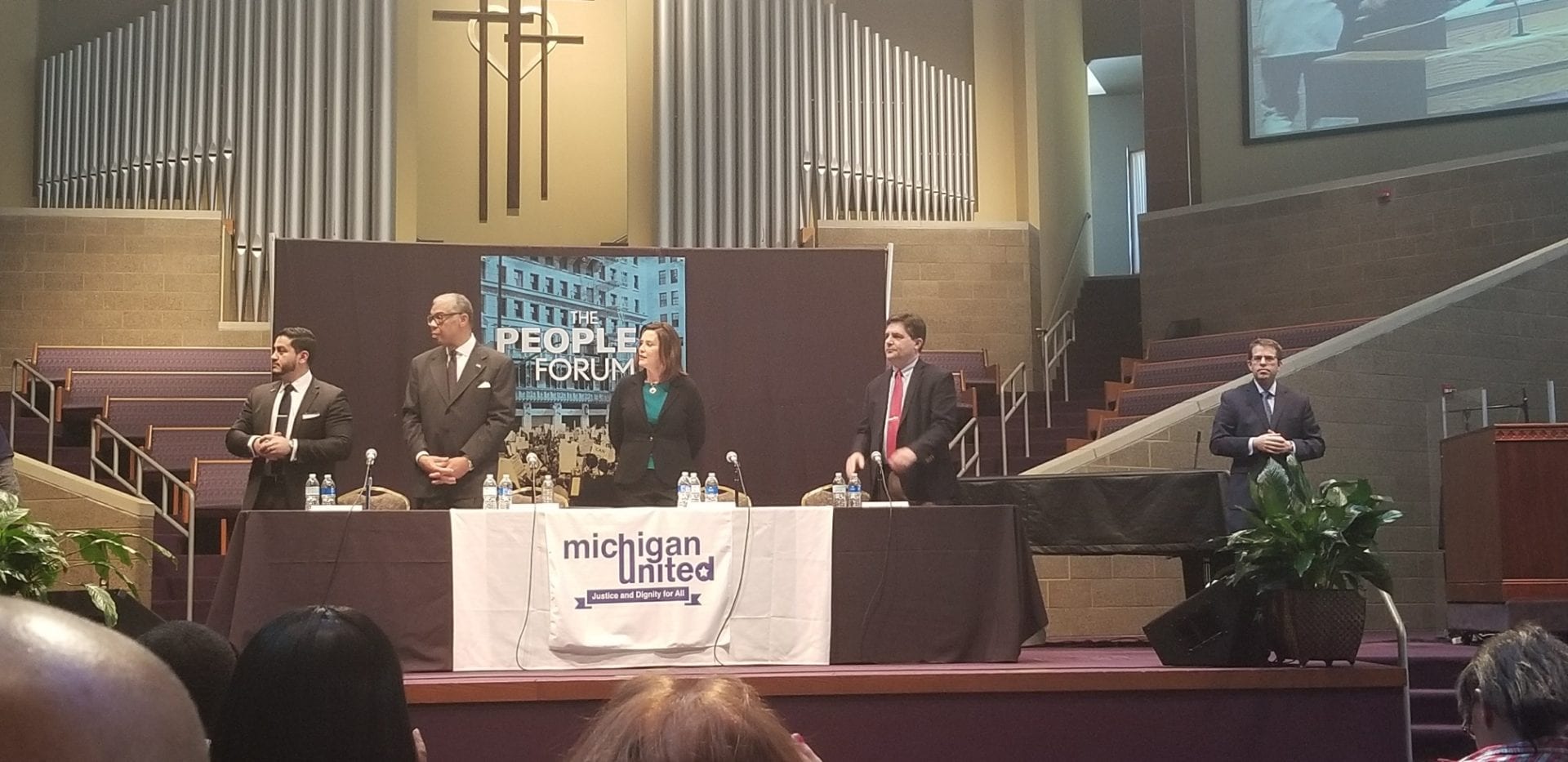
Caring for our loved ones is a key issue in this year's elections in Michigan
by Mike Griffin | March 13, 2018 6:06 pm
This November, Michigan has a critical choice to make for the future of families struggling to get by. Attacks on immigrants, a lack of good paying jobs and the exploding cost of care for children and elders are squeezing Michigan families from all sides.
Last week, Michiganders had a chance to hear from candidates who are running this fall to lead the state as governor. Michigan United, a statewide organization of community members and institutions, held a statewide forum with 79 other co-sponsors, so that families can hear from the candidates. All forum attendees were given index sized cards as they entered, and the volunteers told them to wave the red cards if they disapproved of what the candidate said, and wave the green cards if they supported the candidate’s answers. The candidates were asked a variety of questions from community members.
The issue of care is particularly salient this election with the potential to be a significant motivator for voters. We all want the best for our loved ones, but the cost is often a greater burden than we can afford. For our children, we want them to be safe and nurtured in care that stimulates them. For our seniors, we want them in care that maintains their dignity as they get older. For the people who provide the care, many of whom are women and people of color, we want good paying jobs with good benefits. But in the state of Michigan this kind of care is as rare as a unicorn. Michigan United and its allies launched a campaign for Universal Family Care to reduce the cost of care and improve the job conditions for caregivers.
Families who attended the forum wanted to hear what those running to lead Michigan had to say about the cost of caring for our families and how we treat their caregivers. I watched parents and care givers speak in front of about 1,500 people to tell personal stories about how they were directly affected by the care crisis.
Shanelle Davison, a mother of two from Detroit and a member of the Campaign, asked the candidates how they would address the state’s child care crisis.
Davison works multiple jobs. For her, child care is expensive. She pays $200 a week out of pocket in order to be reimbursed $85 from the state. She called on the candidates to support a universally accessible, high quality, free public system of child care and asked them what they would do to create a program like that in Michigan.
https://www.facebook.com/MichiganUnited/videos/vb.557264687637409/1801786796518519/?type=2&theater
The responses from the candidates could not have been more revealing and presented a stark choice for voters.
On the democratic side, the candidates generally agreed that the answer includes strengthening the role of government in providing child care assistance to families to parents can help make ends meet and their kids can have access to high quality child care.
Democratic candidate Bill Cobbs, an executive with the Xerox Corporation, agreed that parents need help paying for child care so they can stay in the workforce. He said Michigan needs to ensure working parents can receive government subsidies that allow them to provide child care for children.
Democratic candidate Abdul El-Sayed, a Detroit health official, spoke about having family members take care of their newborn child, and how the childcare issue is a civil rights issues.
Democrat state Senator Gretchen Whitmer called for universal early childhood education for every child in Michigan.
Republican state Senator Patrick Colback offered an entirely different view. He said that the best way to promote child care is to protect the sanctity of marriage. He said providing child care or help to pay for child care is not the government’s responsibility. Colback was careful to not explicitly suggest that women should stay home, but that is the obvious implication when conservatives decry single-parent households as the reason why we have a child care crisis. The reality is that, overwhelmingly, women bear the burden for child care whether they are in marriages or not. Moreover, suggesting that marriage alone is the answer is a dangerous ideology. So many women stay in abusive relationships because they cannot afford to make ends meet on their own, and a big factor is the lack of quality affordable child care.
Flashing red cards and raining down boos, the audience made clear that Sen. Colback’s views on women and their role was not welcome in Michigan. We must challenge backward ideology that promotes the belief that women should be privately responsible for the care of their own children, whether they can afford it or not.
This November, families and voters with support from organizations such as Michigan United, are making this election about a different ideology when it comes to caring for our families. Government should be making it easier for families to care for one another, not harder.
